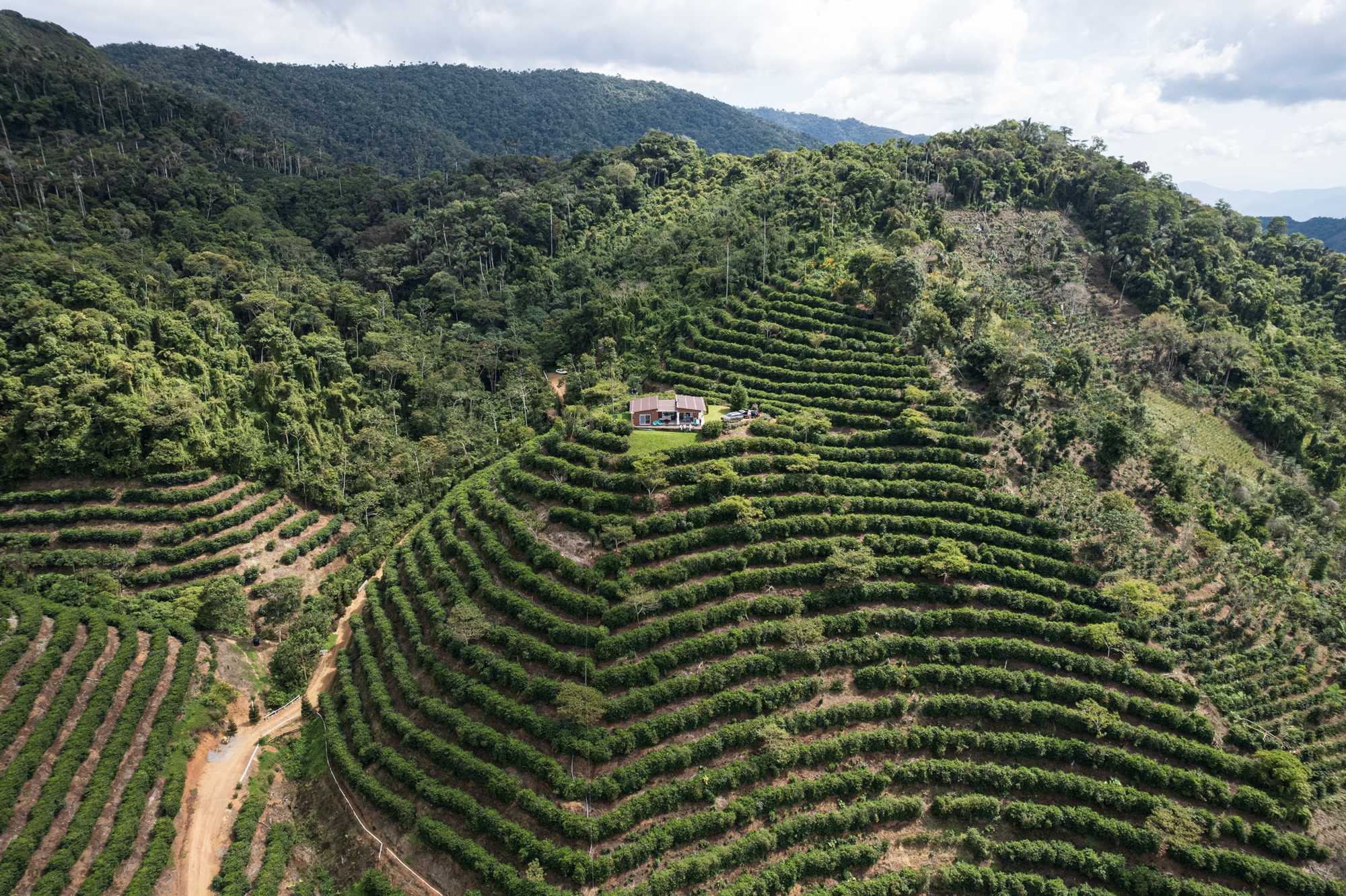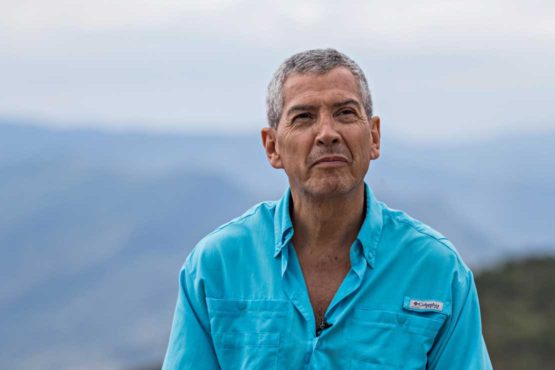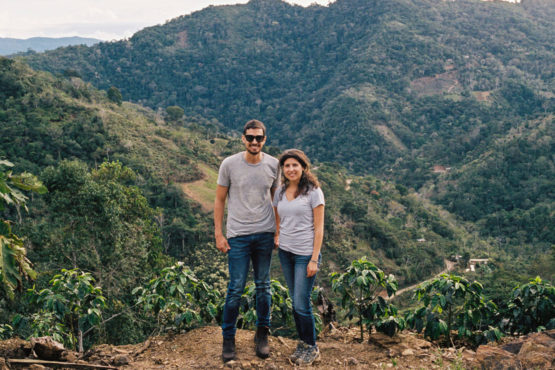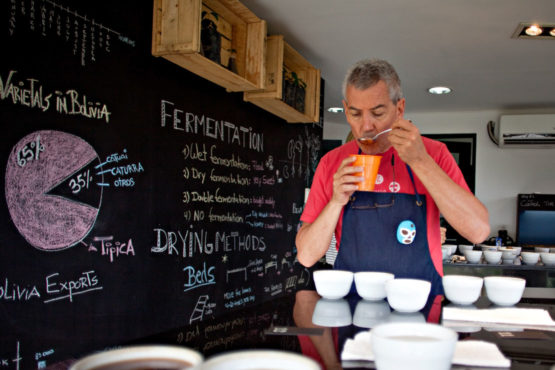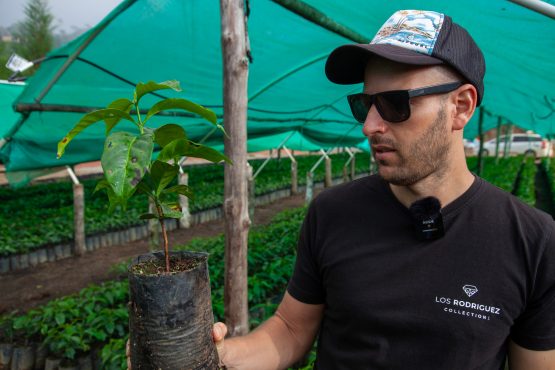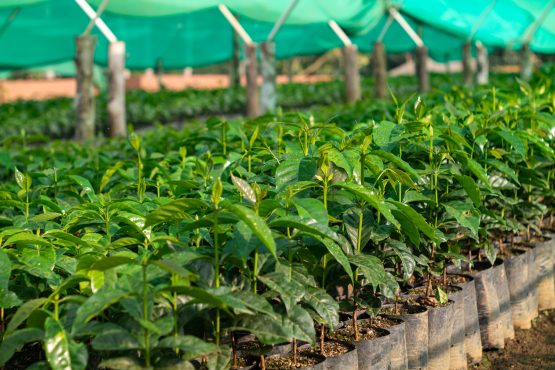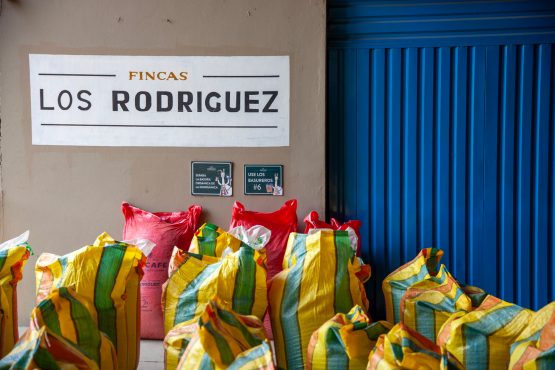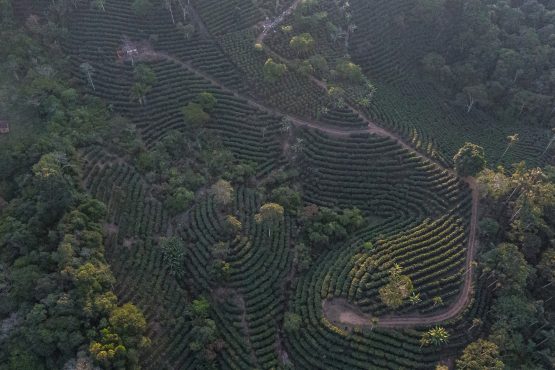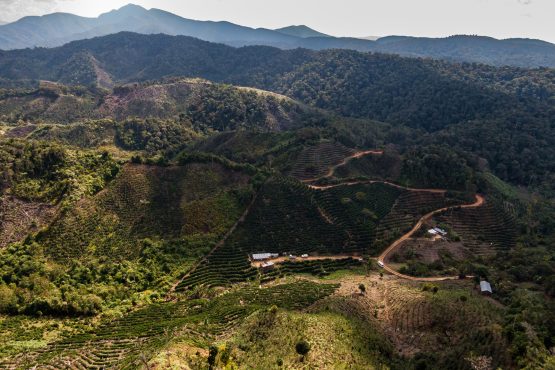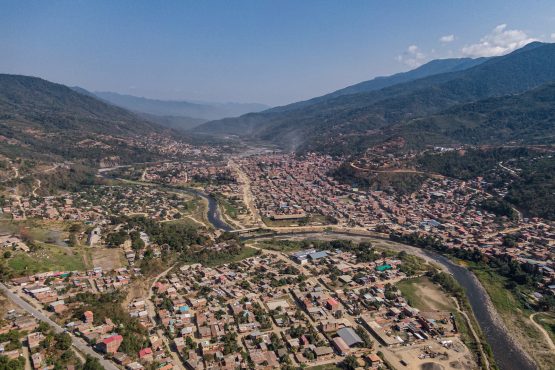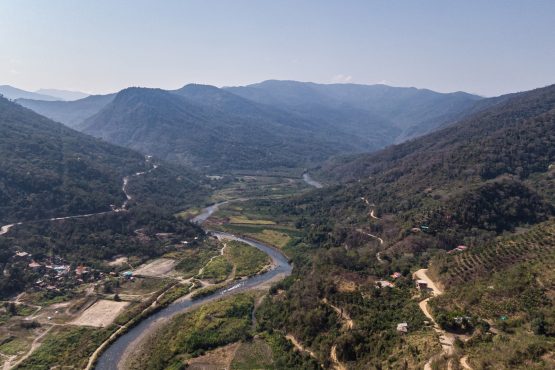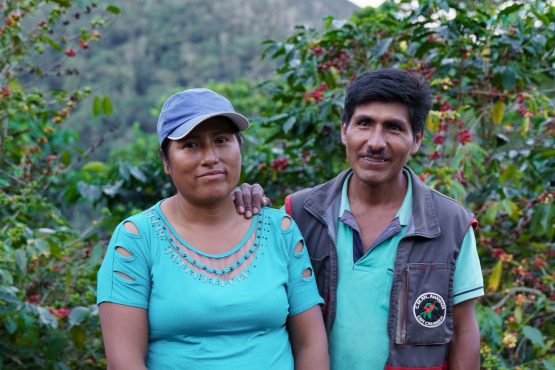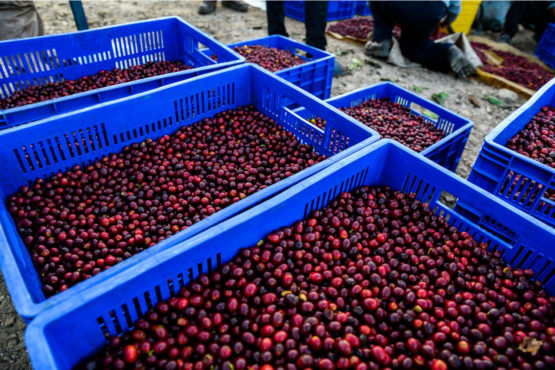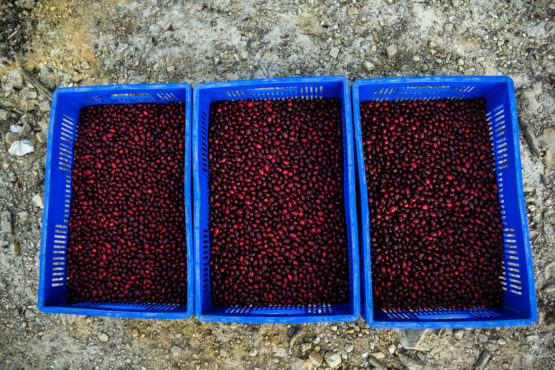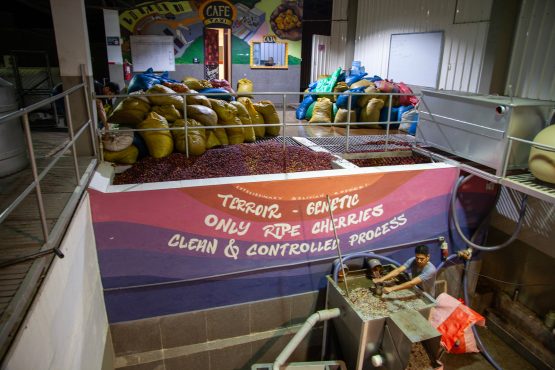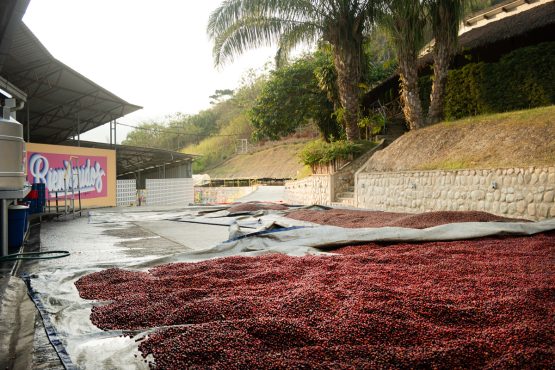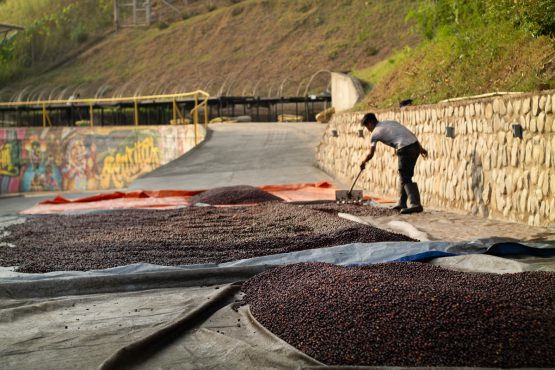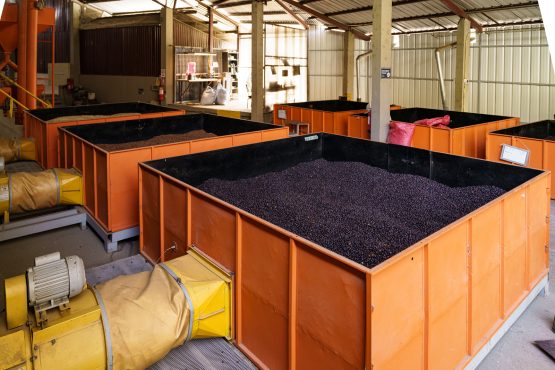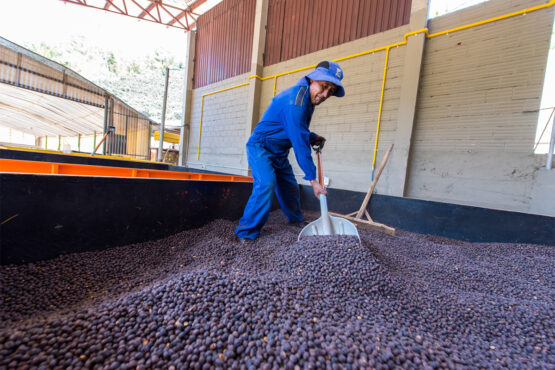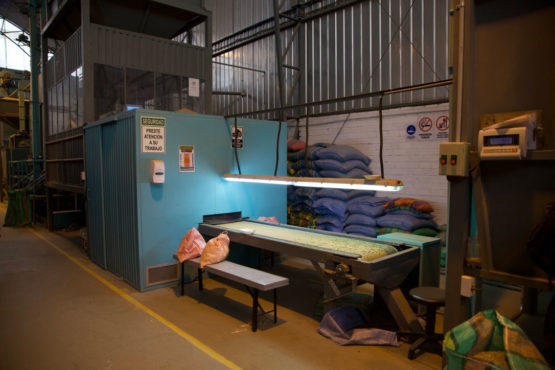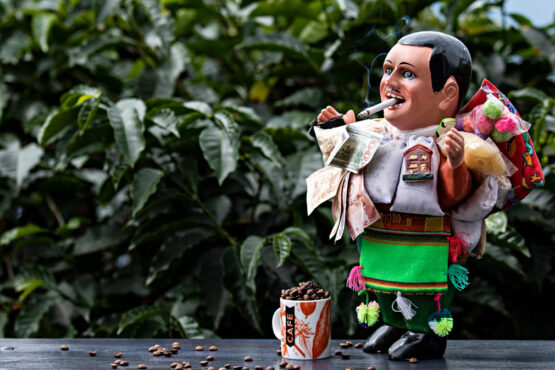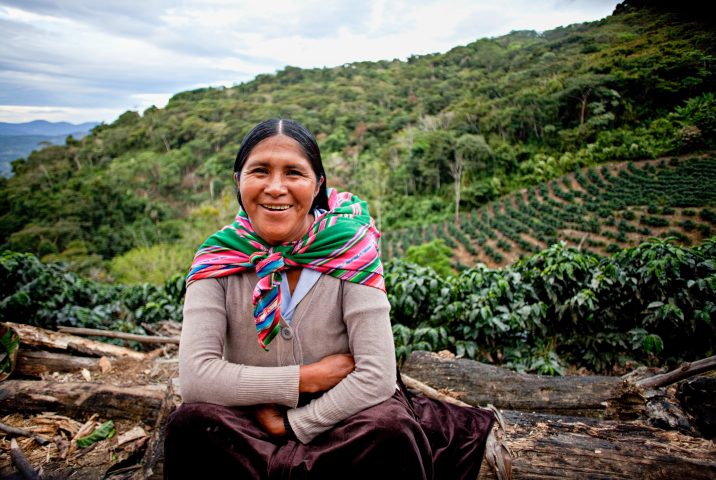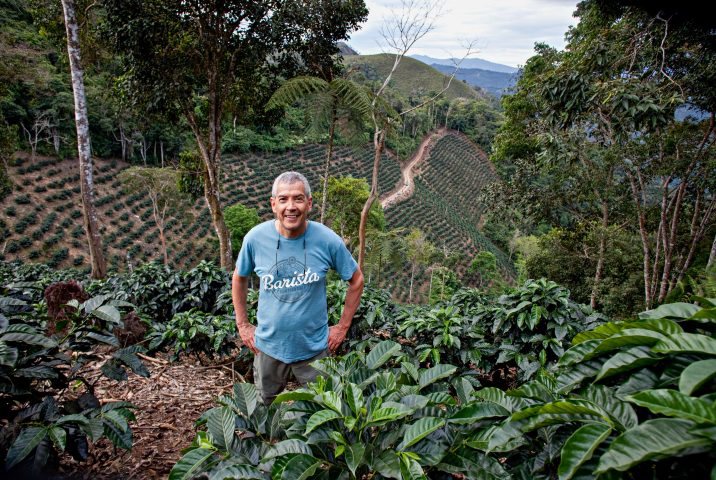Las Alasitas Java Coco Natural
Delicate and pretty. Peach nectar, red grape and blackcurrant, with violet florals and a silky texture.
This special 200kg microlot comes from Las Alasitas, a small farm owned by Pedro Rodríguez. Over the last decade, under the banner of Agricafe, Pedro and his family have worked tirelessly to build the production of, and market for, Bolivian specialty coffee, helping hundreds of local farmers recognise and realise the potential of their land and crops.
Las Alasitas is located in the colonia of Bolinda, which lies in a lush, steep mountain valley around 10 kilometres outside of the town of Caranavi. The colonia of Bolinda was founded 52 years ago and was once known as ‘Bolivia Linda’ or ‘Beautiful Bolivia’. Over the years this name was shortened to Bolinda, and it is now one of the larger settlements in the area.
Las Alasitas was planted in 2014 and is 20.6 hectares in size. The farm sits at about 1,642 metres above sea level and has incredible views over the Los Rodríguez farms and mountains beyond. The views are so special that the family have built a house at the top of the farm called La Casita (shown in the video below), where they welcome friends and guests who come to enjoy the farm at sunset and sunrise, coffee in hand. Due to its high elevation, Las Alasistas experiences cool night-time temperatures and mild day temperatures, resulting in a slow ripening of the coffee cherry grown here. This slow maturation leads to an increased concentration of sugars in the cherry and bean, which produces a sweeter cup of coffee.
Las Alasitas is home to Agricafe’s nursery in Caranavi. Here, agronomists Rodrigo Frigerio (who lives in a small house built on the property) looks after seedlings of the varieties the family grow at their farms, and those shared with the smallholder farmers they work with. The Rodríguez family have invested a lot of time and effort into trying to make each of their plantations a ‘model’ farm that other producers in the area can learn from. Along with a focus on proper farming practices, the family have trialled several varieties at Las Alasitas, including Gesha, San Bernardo, Caturra and Java.
This particular lot is 100% Java –a rare variety with a long history of cultivation. Its name comes from the Indonesian island of Java, where it was first introduced directly from Ethiopia by the Dutch in the early 19th century. From there, it has become popular in West Africa and Central America, where it has thrived as an interesting alternative to the Gesha variety. Java has the potential to be quite profitable to small coffee farmers, thanks to its distinct flavour profile, excellent cup quality, and high tolerance to coffee leaf rust and coffee berry disease. It was originally thought to be a Typica selection, but recent genetic testing revealed it is closely related to an Ethiopian landrace variety known as Abysinia.
In recent years, the Rodríguez have renewed their sustainability efforts across their farms. Understanding that plants are supported by nutrients found in the soil, their practices have shifted to ensure these are constantly being replenished. This includes incorporating fallen leaves and coffee pulp on the bases of each tree, and planting shade trees (including eucalyptus trees and Flamboyanas, a species known locally as “fire flowers” because of their beautiful foliage) in areas with high risk of erosion. Not only have these practices improved Caranavi’s reddish, sandy clay soils, they have also helped boost its biodiversity.
All of the Rodríguez family’s learnings have also been shared with local producers through a training program that the family has developed called ‘Sol de la Mañana.’ Head here to learn more about this wonderful program, and here to learn more about the incredible work the Rodríguez family and Agricafe are doing in Bolivia.
ABOUT CARANAVI
The inhabitants of Caranavi first started farming coffee in the 1950s, when a government-led agrarian reform resulted in small parcels of land (of around 10 hectares in size each) being redistributed back to thousands of largely Aymara families. The Aymara are one of Bolivia’s 36 indigenous nations, who originally lived on the highlands of the Altiplano (a vast plateau of the central Andes that stretches from southern Peru to Bolivia and into northern Chile and Argentina). Along with the Quechuas, who lived in the Bolivian lowlands, both groups immigrated to Caranavi to find a better life through agriculture.
The municipality is located in the Yungas ecoregion, one of South America’s most fertile and diverse locations. The region runs along both sides of the Andes Mountains, and is known for the world’s highest lake, called Titicaca. In the Quechua language, Yungas translates to “the warm lands,” in reference to the rainy, yet warm climate experienced in the region.
HOW THIS COFFEE WAS PROCESSED
At Las Alasitas, pickers from the Villa Rosario community and the state of Beni are hired to carefully handpick the coffee during the harvest. These pickers are hired by Elda and her husband Felix (Carmela Aduviri‘s son), and trained to collect only the very ripest cherries, and multiple passes are made through the farm throughout the harvest to ensure the coffee is picked at its prime. Selective picking is extremely important for special micro-lots like this one, to ensure the sweetest cup. The Rodríguez family has found that harvesting the very ripest (almost purple) cherries result in the most complexity and distinction in the coffee.
Pedro draws a lot of inspiration from the wine industry in his approach to coffee production, and is always innovating and trialling different processing techniques. This lot was processed with experimental techniques, part of the Rodriguez’ family’s long term strategy to achieve the greatest distinction and diversity in their special lots. As Pedro’s daughter, Daniela shares:
“We’re keeping a registry of all the data we’re compiling, to use in the coming seasons. It includes information on the types of tanks used, bacteria and yeast activity, ambient temperature and weather conditions… we’re working hard to identify the ideal processing conditions for each variety and farm.”
Cherries for this lot were delivered to Agricafe’s state of the art mill Buena Vista in the evening. After being inspected and weighed, the coffee cherry was carefully sorted by weight using water, and floaters were removed. Following this, the coffee was placed a conveyor belt and disinfected, in a similar process used for wine grapes. It was then carefully washed and laid out to dry on patio for 48-72 hours, before being placed in one of Buena Vista’s ‘stationary box’ (or coco) dryers for up to 55 more hours, until it reached 11.5% humidity.
These boxes are series of steel containers that are typically used for drying cocoa pods. They use a gentle flow of warm air from below the coffee bed to dry the parchment slowly and evenly. Coffee was stirred manually at regular intervals to further ensure it dried at a uniform rate.
Once the coffee was dry, it was transported to La Paz where it was rested before being milled at Agricafe’s dry mill, La Luna. At this state-of-the-art mill the coffee was first hulled and sorted using machinery, and then by a team of workers who meticulously sorted the coffee by hand under UV and natural light. The mill is one of the cleanest and most impressive we have seen – you can read more about it here.
WHATS IN A NAME?
Alasitas means “Buy Me” in the local Aymara native language. The name comes from a festival called Alasitas, which is a festival of desires and honours the Andean god of abundance.
Starting at noon on the 24th of January every year (which also happens to be Pedro Pablo’s birthday!) Bolivia’s capital, La Paz, comes alive with a sense of promise, wishfulness and whimsy. The scene may seem strange to someone unfamiliar with this cultural event — that has its roots in pre-Colombian Aymara traditions and has evolved over the centuries to incorporate elements of Catholicism and Western consumerism — but to locals, Alasitas is an important fixture in their calendar.
During the festival, thousands flock to La Paz to buy miniature items — cars, hours, university degrees, suitcases full of cash, potential spouses — of everything they want in the coming year. It can be something material, or something that brings luck, like a chicken that will help you find love or a frog that will bring you good fortune. All miniatures are blessed by a Yatiri (a spiritual leader in Aymara culture) and offered to the Ekeko, the Andean god of abundance. Miniatures are exchanged with family and friends, in a hope that their dreams will be realised, and in turn, you will also be blessed with abundance.
Reciprocity is at the heart of the Alasitas festivals and it is for this reason that it is a fitting name for the farm. The Alasitas farm is one of the largest the Rodriguez’s own in Caranavi and was created with the vision of becoming a model farm local coffee growers could learn from, and be inspired by, thus helping them realise the vast potential of their land and crops.
